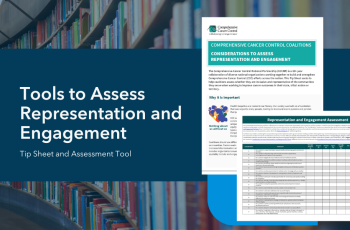This work was supported by Cooperative Agreement #NU58DP007539-01 from the Centers for Disease Control and Prevention (CDC).
Health Equity
This Tip Sheet is part of a series offered through the CCCNP to assist Comprehensive Cancer Control (CCC) coalitions assess whether they are inclusive and representative of the communities they serve when working to improve cancer outcomes in their state, tribal nation or territory.
This series of videos and accompanying resources addresses strengthening cancer health equity in LGBTQ+ communities.
This annual report tracks federal, state, and local investment in public health and how underinvestment in public health programs hobbled the COVID-19 response, exacerbates health inequities, and continues to put Americans' lives and livelihoods at risk.
SelfMade Health Network “Healthier Nation” Fact Sheets can be used while developing or enhancing partnerships with Chambers of Commerce, businesses, labor unions, small business associations, and minority-owned businesses, as well as other major stakeholders committed to reducing committed to…
The Centers for Disease Control and Prevention’s (CDC’s) Division of Cancer Prevention and Control selected four National Comprehensive Cancer Control Program (NCCCP) award recipients (pilot sites) to conduct a pilot project, Improving the Health and Wellness of Cancer Survivors in Rural…
The 2022 County Health Rankings National Findings Report examines the issues and opportunities to ensure economic security and health for all through a living wage, fair pay for women, affordable and accessible childcare, and well-resourced, equitably funded schools.
The No Menthol Sunday toolkit details the 2022 theme and contains templates, sermon topics, fact sheets, activities and inspiration for your faith community event.
Research from the Collaborative on Media & Messaging for Health and Social Policy explores public understanding and concern about health inequities, examines how various audiences react to messaging about health inequity, and describes strategies to avoid common pitfalls and misunderstandings…
This insightful discussion dug deeper into what data exists on health disparities, what are the gaps in data and how those gaps could be closed and/or existing data better used to implement change that addresses the disparities.
This document was produced by the Iowa Cancer Consortium Policy Workgroup as a resource for Consortium members and other cancer control advocates who are interested in how policy can reduce cancer-related disparities.
